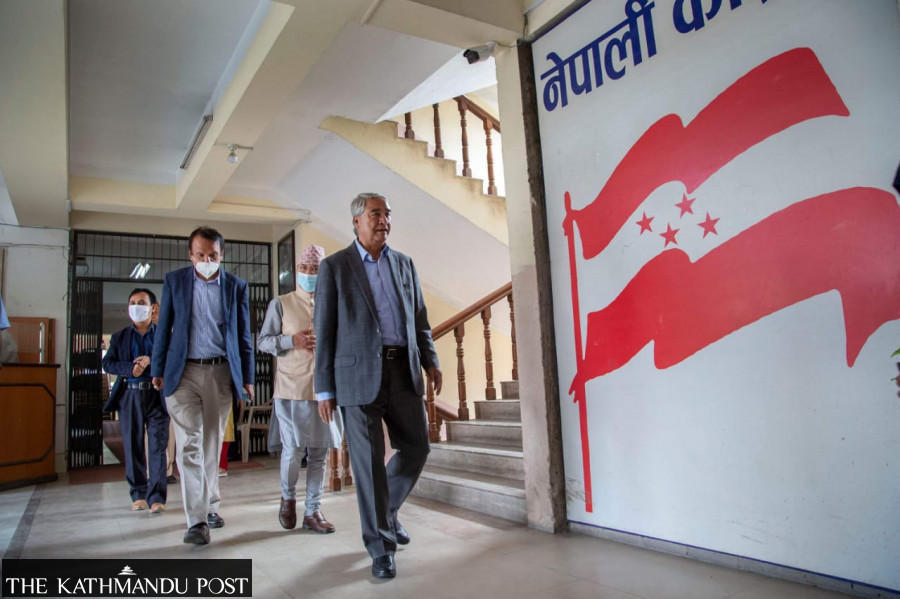Politics
Is Congress the main opposition? It’s Speaker’s call
Different political parties, two with just a seat each, have claimed the main opposition status in the House.
Binod Ghimire
The Nepali Congress won most seats in the federal and provincial elections held on November 20. The largest legislative party, however, is not in the government. And now its status as the main opposition party in the House of Representatives too has become contentious.
President Bidya Devi Bhandari on December 25 appointed CPN (Maoist Centre) chairperson Pushpa Kamal Dahal, who got the support of 269 lawmakers from seven parties and independents in a floor test on January 10, as the prime minister. However, except Nepal Majdoor Kisan Party and Rastriya Janamorcha, all other parties, including the Congress, backed Dahal’s premiership in the confidence vote. Since then, the Majdoor Kisan Party has been demanding the status of the main opposition.
On Friday, the party with one lawmaker wrote to Speaker Dev Raj Ghimire, seeking to be declared the main opposition. The Rastriya Janamorcha also has claimed the status. Though these two parties only have a seat each in the House, the Majdoor Kisan Party garnered more votes than the Rastriya Janamorcha under the proportional representation category.
The Congress had on January 13 written to the Parliament Secretariat, seeking information regarding the perks for the main opposition party and its leader. “Different parties have put forth their claims to be the main opposition,” Ek Ram Giri, spokesperson for the Parliament Secretariat, told the Post.
The confusion on which party would get the status was created by the Act relating to the pay and perks of the officials and members of the federal parliament. It says the largest party in the House or the National Assembly that hasn’t formed the government nor supported Cabinet formation and has 10 percent or more members in the House becomes the main opposition.
If no party has 10 percent seats, the Speaker of the House and the Assembly chair can designate the main opposition in the respective chambers, according to the Act.
As the Congress voted in Dahal’s favour during the floor test, the Majdoor Kisan Party and the Rastriya Janamorcha argue, it doesn’t qualify to be the main opposition. They claim that the largest party in the lower house is part of the ruling alliance after giving the Dahal government its vote of confidence.
Some constitutional experts have a similar view. They say making Congress the main opposition will violate the Act. “By the term ‘supporting Cabinet formation’, the Act means that those parties that supported the prime minister in the floor test are also disqualified to become the main opposition,” senior advocate Purna Man Shakya told the Post.
However, any decision—either to declare the Congress or any other party the main opposition—is likely to be challenged in court. “The Congress shouldn’t have voted for Dahal if it wanted the seat of the main opposition,” said Shakya, who is also a professor at Nepal Law Campus.
Other constitutional experts don’t see a problem in Congress becoming the main opposition. “After the Congress tried to be a part of the power-sharing deal, there is a confusion of whether it actually is an opposition. But it also cannot be called a part of the ruling alliance just because it gave the prime minister the vote of confidence,” Bipin Adhikari, a professor and former dean at the Kathmandu University School of Law, told the Post.
“The Speaker can give the Congress the status of the main opposition. He, however, needs to ask the party to be clear whether it is in the opposition or a part of the ruling coalition.”
In addition to several benefits in pay and perks, the leader of the opposition is an ex-officio member of the Constitutional Council led by the prime minister. The six-member council recommends candidates for chairs and members of various constitutional commissions, along with the chief justice.
The council now needs to recommend a new chief justice, a position that remains vacant after the retirement of Cholendra Shumsher Rana.
Senior officials at the Parliament Secretariat also say there is no legal hurdle in giving Congress the status of the main opposition. “I think this is more of a moral issue than legal,” a joint-secretary at the parliament secretariat told the Post on the condition of anonymity. “The Congress is answerable for its decision to support the prime minister in the floor test, but that doesn’t bar it from being the main opposition.”
The official cited a precedent from 1994 when the Congress got the status of the main opposition despite voting for the then Manmohan Adhikari government in the floor test.
“Now it is up to the Speaker to decide. I don’t think he would want to take the risk of picking a party with only one seat as the main opposition instead of the Congress.”




 18.12°C Kathmandu
18.12°C Kathmandu















